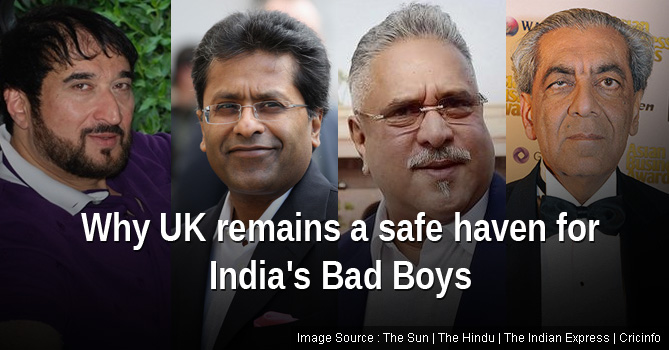Money talks and it talks loudest in the UK. It is a fact that has emerged since the late ’60s and early ’70s when the UK and specifically, London, began to be known as the most sought after destination for global fugitives.
Illegal money is known to be routed through safe havens like Cayman Islands and parked in Swiss banks, but people behind that money mostly end up living in London. So much for British righteousness! When it comes to money, the British government is most welcoming while turning a blind eye to its source or the history of those who bring it.
Name a country and you will find a fugitive from that country living comfortably in the UK, as long as the person brings along the mandatory £2mn. Yes, hiding really is that easy!
Just as the international clamour for disclosures was rebuffed for years by the Swiss government, citing their secrecy laws while accepting cash, gold and other forms of deposits; the UK, too, cites its laws to turn a blind eye while allowing fugitives into their country, with few questions asked.
India has been a major victim to this practice. From downright criminals, fraudsters and scamsters to pro-Khalistan and Kashmiri militants, UK houses them all under various legal pretexts. Bottom line, they bring money into the UK and so the government looks the other way.
India has been asking the UK government to extradite/deport many of these elements, but has found itself wrong footed in the maze of British laws that are designed to protect and retain such dubious persons.
The numbers speak for themselves. India has submitted around 131 requests for extradition of persons who have cases of terrorism, murder, extortion, financial fraud, money laundering and espionage filed against them. The UK has only extradited 1 person until now. Had he challenged the extradition, he could have still been living in the UK. The British laws are designed to ensure a fugitive gets to stay on endlessly, as long as he fulfils the ‘financial’ criteria for his welcome.
It must be said here that a large part of the blame for the failure to extradite lies in poor investigation, poor legal build-up of the case and inadequate submission of proof. All these have given the UK judicial system reasons for rejecting such cases.
There have been exceptions, though. When adequate pressure is applied, the British government more than bends itself backwards. The best example would be the ‘bottling up’ of Julian Assange in the Ecuadorian Embassy in London, against all diplomatic norm and protocol, all on the ‘request’ of the US government. India does not enjoy that kind of leverage, but since the British Prime Minister is on her maiden India visit after taking office, it must apply all its diplomatic pressure to get the UK government to act.
Rogues who comprise the Hall of Shame for the UK
- Lord Sudhir Choudhrie: This UK-based billionaire and arms dealer was awarded the Asian Business Lifetime Achievement Year Award 2013, by none other than the current British PM Theresa May, when she was Home Secretary. He is today being investigated for bribery in defence deals involving India. He has a Red Corner notice issued against him by the CBI.
- Vijay Mallya: Wanted in the Kingfisher Airlines case for defaulting on Rs 9,000 crore loans, money laundering and fraud, he found a safe haven in the UK and continues to enjoy full British hospitality. Indian government is now trying for his extradition.
- Lalit Modi: Wanted for corruption, fraud and financial irregularities, the IPL founder has cleverly invested in a Law firm in the UK that specializes in Interpol-related cases. He is apparently offering legal help and advice to his ‘buddy’ Vijay Mallya.
- Tiger Hanif: A known aide of Dawood Ibrahim and wanted in the Gujarat blast case of 1993, he continues to enjoy British hospitality. His case for extradition has been sitting on Theresa May’s desk for the last 3 years while she served as Home Secretary, with no action taken.
- Ravi Shankaran: Wanted in the Naval War-room espionage case in India, he continues to live happily in the UK.
- Nadeem Saifi: Wanted for murder of music baron, Gulshan Kumar, Nadeem escaped to the UK and is now a British citizen living in the UAE. India cannot touch him as he is now a British citizen. Attempts to extradite him were rejected by the British Supreme Court in 2000.
- Sanjeev Chawla: Chawla is wanted in the cricket bookie-scandal case involving Hansie Cronje, in 2000. Despite the Indian government’s repeated attempts to bring him back, he continues to remain in the UK.
But this is not all, the list of wanted men from India is as long as the legal road to extradite them.
The international list of persons who are known to have committed fraud, money laundering and other economic, criminal and political crimes have found a safe haven in the UK, as it continues to remain a favoured destination for dubious persons. Not a nation PM Theresa May would like to promote as she comes calling on India.
Read More:
SBI Writes-Off Defaulters’ Loans from Balance Sheet
British PM Theresa May is on a 3 Day Visit to India
Will the New UK Visa Norms Impact Indian Techies?
Highlights of Modi’s UK visit reinforces India’s status as a rising power






